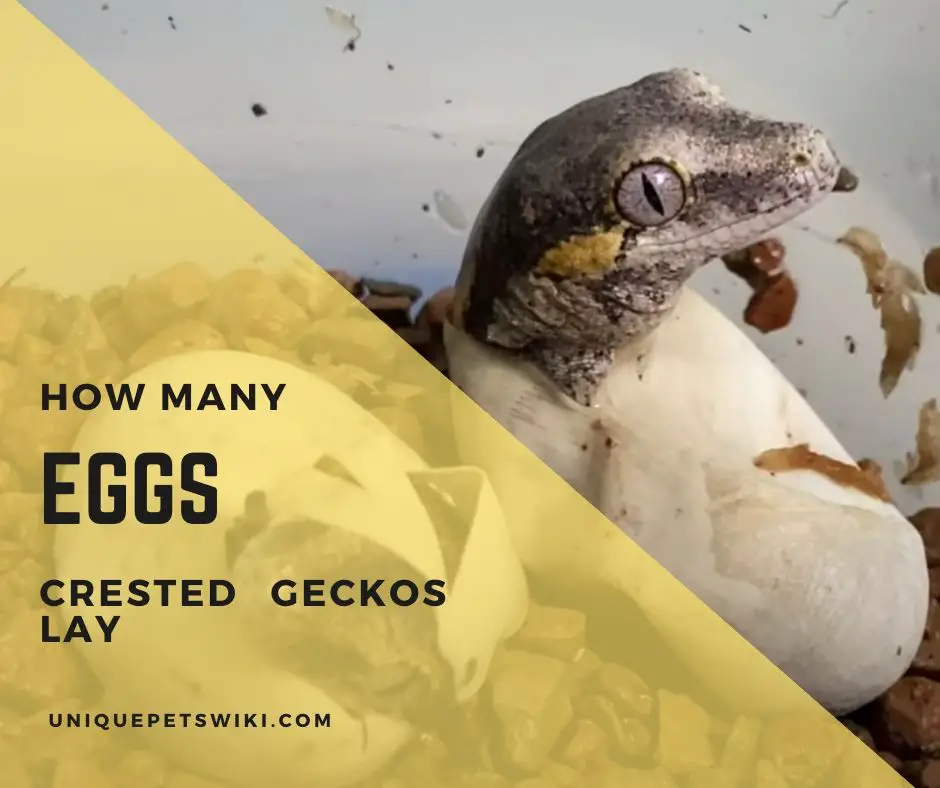Crested geckos are among the cutest lizards that you can keep as pets.
It is also among the easiest to breed, which makes it a popular pet among breeders.
Crested geckos are known as a prolific breeder, and even novice keepers can breed them.
New to crested gecko? Check out the crested gecko care sheet now! We had listed out all the things you need to know about crested gecko as pets. Check it now!
If you are wondering how many eggs that crested geckos lay or how often they lay eggs, this article is the best for you.
Contents
When Do Crested Geckos Start Laying Eggs?
It is best to breed your crested geckos when they are about 18-24 months old or about 35-40 grams.
If you want to start breeding, you can subtract 2 grams of the weight of your gecko if it does not have a tail.
Breeding of crested geckos is based on numerous factors like health, feeding schedules, and several other factors.
This is why it is best if your crested geckos are around 18-24 months before breeding.
Let’s continue reading
Can My Crested Geckos Lay Eggs Without Mating?
Yes, females crested geckos like several female reptiles will produce and lay unfertilized eggs.
The infertile eggs are known as slug eggs. Crested geckos lay infertile eggs when it is not possible to mate, and the eggs will not produce an embryo.
Laying of eggs without mating usually varies between individuals.
Some female crested geckos will lay eggs without mating every year, whereas some female crested geckos will not.
How Often Do Crested Geckos Lay Infertile Eggs?
Female crested geckos will start laying eggs once they are about a year old with about 25-35 grams.
If you do not expose them to a male, it will lay a clutch of infertile eggs.
Once your geckos attain this maturity, it is best if you put a male in with her. You should note that big or fat females are not healthy and productive breeders.
You should avoid the baby food if you want to fatten a female up for breeding.
When it comes to breeding, the nutrition you provide your gecko is more important than its size.
Most times, the hatch rate of eggs produced by first-year breeder females is usually lower than the eggs produced by the older females.
New to crested gecko? Check out the crested gecko care sheet now! We had listed out all the things you need to know about crested gecko as pets. Check it now!
You should not be discouraged if you have some bad eggs because a healthy and mature female lays a clutch of two eggs around 30-45 days.
Female geckos can breed year-round, but it will shut down for sometime after laying 7-9 clutches before starting again in 10-12 weeks.
How Many Eggs Do Crested Geckos Lay?
Female crested geckos will lay two eggs in an egg-deposition chamber or the enclosure every 30-45 days.
Female crested geckos will dig a hole in the substrate where it lays the eggs and then covers them up.
During the breeding season, a female crested gecko can lay around 6-10 clutches. The breeding season usually lasts for around eight months.
Once your crested gecko lays the egg, you will need to remove them from the chamber or enclosure within 24 hours.
You need to remove them so the eggs will dehydrate and may not hatch if you incubate it.
When you are handling the eggs, try to be gentle and remove it individually while you place them in the incubation box.
You should also avoid rotating them when you transfer it so that the embryo will not detach from the shell.
How Long Does it Take for a Crested Gecko to Lay Eggs?
Once a female gecko wants to lay an egg, it will find a place suitable for laying eggs. It will then lay the eggs in the box by digging the substrate and covering it after laying eggs. Crested geckos use around 45-60 minutes to lay eggs.
If you notice that your crested gecko is laying eggs, it is best to keep your distance and do not bother her. You can then check the box later for her eggs.
Some keeper might worry what are the signs of a dead crested gecko egg because it hasn’t hatched after the incubating period.
The expert tip is: Leave your crested gecko egg alone even after the 60 days, unless you clearly smell some odor from the egg.
Conclusion
Crested geckos are a prolific breeder and offer an effortless breeding option for breeders. Once it is about 25-35gram range, it will start to lay eggs even if you do not expose it to a male.
Everything from this article shows how crested gecko is a perfect fit for beginner to experienced breeders due to its easy care and success rate.

While all slugs are in fact infertile, not all infertile eggs are slugs. If attempting to educate the novice, for the love of reptiles, give accurate information! It’s not as if it’s new information or even debated information. It’s terminology that’s been used for over a hundred years. And it’s terminology used for ALL egg laying animals, not just reptiles. Miss used terms leds to miss information &/or confusion. There’s enough of that out there already.
Slugs are formed when the reproductive female is lacking a particular nutrient in the formation of that one particular egg. For example if her body didn’t provide enough calcium or enough amino acids for the yolk protein, then the egg will not develop properly and forms a slug. An unhealthy female could produce several slugs. Just as a healthy female can lay several clutches with healthy eggs that are infertile.